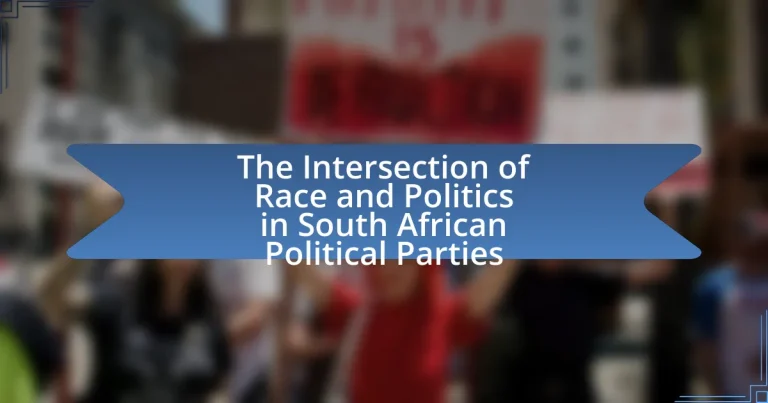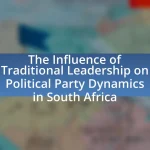The article examines the intersection of race and politics within South African political parties, highlighting how historical racial divisions, rooted in apartheid, continue to influence party dynamics, voter behavior, and policy formulation. It discusses the formation of major political parties such as the African National Congress (ANC) and the Democratic Alliance (DA), their approaches to racial issues, and the implications of race on contemporary political discourse. Key events that shaped racial dynamics, the challenges faced by parties in achieving racial equality, and strategies for fostering inclusivity are also explored, providing a comprehensive overview of the ongoing impact of race in South Africa’s political landscape.
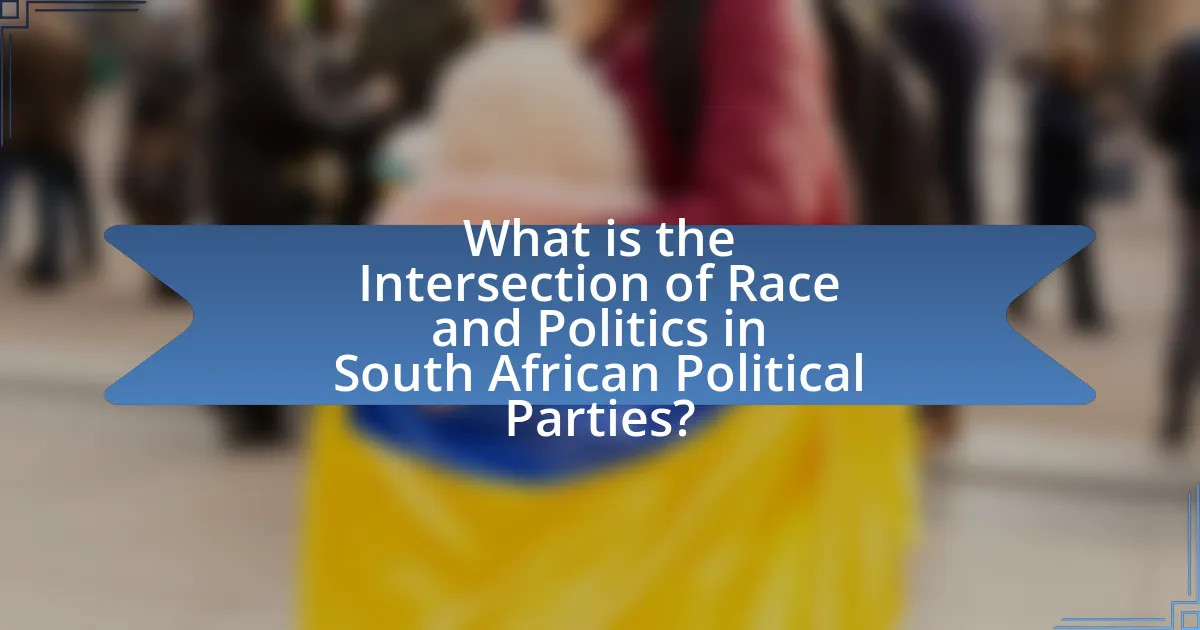
What is the Intersection of Race and Politics in South African Political Parties?
The intersection of race and politics in South African political parties is characterized by the ongoing influence of racial identities on party dynamics, voter behavior, and policy formulation. Historically, the apartheid regime entrenched racial divisions, leading to the formation of political parties that often align along racial lines, such as the African National Congress (ANC) representing the black majority and the Democratic Alliance (DA) appealing to a predominantly white and mixed-race electorate. This racial alignment continues to shape electoral strategies and party platforms, as evidenced by the ANC’s focus on black empowerment policies and the DA’s emphasis on non-racialism and economic liberalism. Additionally, the 2019 national elections highlighted the persistence of racial voting patterns, with 56% of black voters supporting the ANC compared to only 22% for the DA, illustrating how race remains a critical factor in South African politics.
How has race historically influenced South African political parties?
Race has historically influenced South African political parties by shaping their ideologies, membership, and electoral strategies. The apartheid system, which enforced racial segregation and discrimination, led to the formation of political parties that primarily represented the interests of specific racial groups, such as the African National Congress (ANC) for black South Africans and the National Party (NP) for white South Africans. This division was evident in the 1948 elections, where the NP’s platform was built on maintaining white supremacy, while the ANC sought to dismantle apartheid and promote equality. The racial dynamics continued to affect party politics post-apartheid, as parties like the ANC aimed to address historical injustices, while others, such as the Democratic Alliance, focused on appealing to a broader, racially diverse electorate. The legacy of race remains a critical factor in shaping political discourse and party alignment in South Africa today.
What key events shaped the racial dynamics in South African politics?
Key events that shaped the racial dynamics in South African politics include the establishment of apartheid in 1948, the Sharpeville Massacre in 1960, the Soweto Uprising in 1976, and the end of apartheid with the 1994 democratic elections. The apartheid system institutionalized racial segregation and discrimination, leading to widespread resistance and international condemnation. The Sharpeville Massacre, where police killed 69 protesters, galvanized anti-apartheid movements and drew global attention. The Soweto Uprising, sparked by student protests against Afrikaans as the medium of instruction, highlighted the youth’s role in the struggle against apartheid. The culmination of these events was the 1994 elections, which marked the official end of apartheid and the establishment of a multiracial democracy, fundamentally altering the political landscape and racial dynamics in South Africa.
How did apartheid policies affect political party formation?
Apartheid policies significantly influenced political party formation in South Africa by enforcing racial segregation and limiting political participation for non-white citizens. The institutionalization of racial discrimination led to the emergence of political parties that specifically represented the interests of marginalized groups, such as the African National Congress (ANC) and the Pan Africanist Congress (PAC), which were formed in response to the oppressive regime. These parties aimed to challenge the apartheid system and advocate for equal rights, reflecting the socio-political landscape shaped by apartheid laws. The 1956 formation of the ANC’s Defiance Campaign and the subsequent rise of other anti-apartheid movements illustrate how apartheid policies directly catalyzed the creation of organized political resistance among oppressed communities.
What role does race play in contemporary South African political discourse?
Race plays a central role in contemporary South African political discourse, influencing party ideologies, voter behavior, and policy-making. The legacy of apartheid continues to shape political identities and affiliations, with race often determining party loyalty; for instance, the African National Congress (ANC) primarily attracts Black voters, while the Democratic Alliance (DA) has a significant support base among white and mixed-race populations. Additionally, discussions around land reform and economic inequality are heavily intertwined with racial dynamics, as historical injustices related to land ownership remain a contentious issue. The 2021 local elections highlighted these racial divides, with parties leveraging race to mobilize support and frame their political narratives, demonstrating that race remains a pivotal factor in shaping the political landscape in South Africa.
How do political parties address racial issues in their platforms?
Political parties in South Africa address racial issues in their platforms by incorporating policies aimed at promoting equality, social justice, and redress for historical injustices. For instance, the African National Congress (ANC) emphasizes land reform and economic empowerment for historically marginalized communities, reflecting its commitment to addressing the racial disparities rooted in apartheid. The Economic Freedom Fighters (EFF) advocate for radical economic transformation, focusing on the redistribution of wealth and land to benefit black South Africans. Additionally, the Democratic Alliance (DA) promotes non-racialism and equal opportunity, aiming to create a society where race does not determine access to resources. These approaches are grounded in the historical context of racial inequality in South Africa, as evidenced by the ongoing socio-economic disparities highlighted in reports from the South African Human Sciences Research Council.
What are the implications of race on voter behavior and party support?
Race significantly influences voter behavior and party support in South Africa, shaping political affiliations and electoral outcomes. Historical context reveals that racial identity often dictates party loyalty, with the African National Congress (ANC) predominantly supported by Black voters, while parties like the Democratic Alliance (DA) attract a larger share of White and Coloured voters. According to the 2019 South African Electoral Commission data, approximately 57% of Black voters supported the ANC, compared to only 19% of White voters. This trend underscores how race not only affects individual voting decisions but also reinforces systemic patterns of political alignment, leading to a fragmented political landscape where race remains a pivotal factor in shaping party dynamics and electoral strategies.
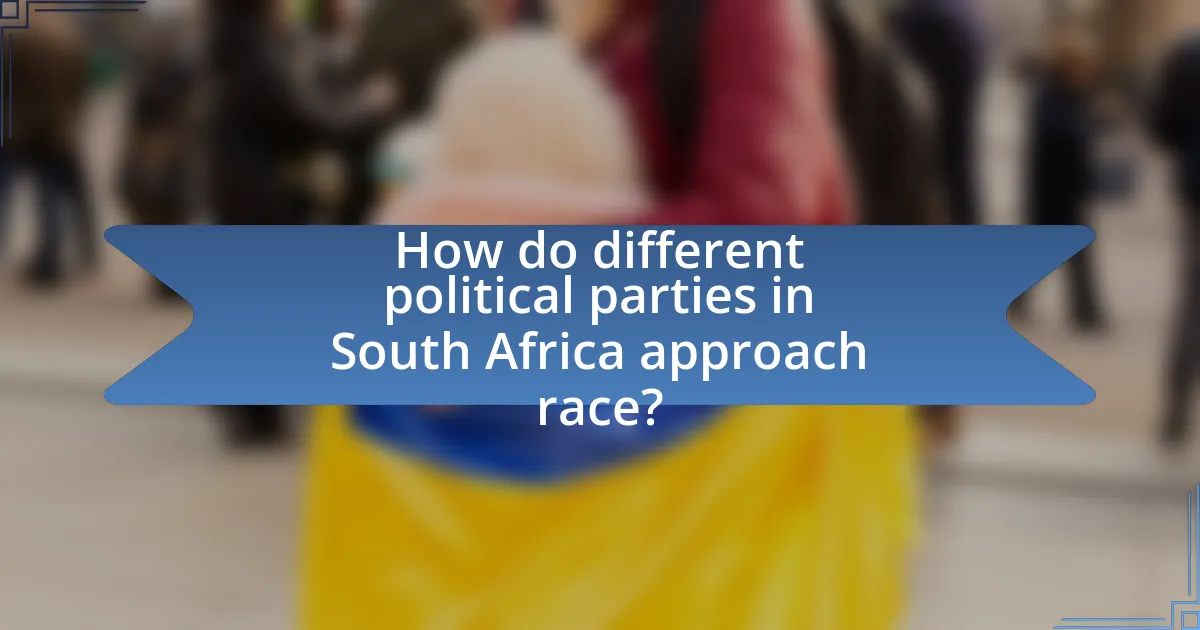
How do different political parties in South Africa approach race?
Different political parties in South Africa approach race through distinct ideologies and policies. The African National Congress (ANC) emphasizes racial equality and transformation, advocating for affirmative action and land reform to address historical injustices. The Democratic Alliance (DA) promotes a non-racial approach, focusing on equal opportunity and economic empowerment without specific racial policies. The Economic Freedom Fighters (EFF) adopt a radical stance, calling for the expropriation of land without compensation to rectify racial disparities. These approaches reflect the parties’ historical contexts and their strategies to appeal to various voter demographics, shaping the political landscape in post-apartheid South Africa.
What are the major political parties in South Africa and their racial policies?
The major political parties in South Africa include the African National Congress (ANC), the Democratic Alliance (DA), and the Economic Freedom Fighters (EFF), each with distinct racial policies. The ANC, historically rooted in anti-apartheid struggle, promotes policies aimed at redressing racial inequalities through affirmative action and land reform, emphasizing the need for economic empowerment of black South Africans. The DA, which positions itself as a liberal party, advocates for non-racialism and equal opportunity, focusing on merit-based policies while facing criticism for perceived lack of representation of black South Africans in leadership. The EFF, a radical leftist party, calls for the expropriation of land without compensation and prioritizes the interests of black South Africans, aiming to dismantle the economic structures established during apartheid. These parties reflect the complex interplay of race and politics in South Africa, each addressing racial issues through different ideological lenses.
How does the African National Congress (ANC) address race in its policies?
The African National Congress (ANC) addresses race in its policies by implementing affirmative action and promoting racial equality to rectify historical injustices. The ANC’s policies, such as the Employment Equity Act and Broad-Based Black Economic Empowerment, aim to increase representation and opportunities for historically marginalized racial groups in various sectors. These initiatives are grounded in the ANC’s commitment to dismantling apartheid-era inequalities and fostering a more inclusive society, as evidenced by their constitutional framework which emphasizes non-racialism and equality.
What is the stance of the Democratic Alliance (DA) on racial issues?
The Democratic Alliance (DA) advocates for a non-racial society and opposes racial discrimination in all forms. The party emphasizes equality and seeks to promote policies that foster social cohesion and economic opportunities for all South Africans, regardless of race. The DA’s commitment to non-racialism is reflected in its policies aimed at addressing historical injustices while promoting merit-based systems. This stance is supported by the party’s consistent messaging and policy frameworks that prioritize inclusivity and equal rights, aligning with South Africa’s constitutional values.
How do smaller parties contribute to the conversation on race?
Smaller parties contribute to the conversation on race by introducing diverse perspectives and advocating for marginalized communities. These parties often prioritize issues related to race and social justice, which can challenge the dominant narratives presented by larger parties. For instance, the Economic Freedom Fighters (EFF) in South Africa has focused on land reform and economic inequality, highlighting the racial disparities in land ownership. Additionally, smaller parties can mobilize grassroots support and raise awareness about racial issues that may be overlooked by mainstream political discourse, thereby enriching the overall dialogue on race in the political landscape.
What unique perspectives do parties like the Economic Freedom Fighters (EFF) offer?
The Economic Freedom Fighters (EFF) offer a unique perspective centered on radical economic transformation and the redistribution of wealth in South Africa. This perspective is rooted in the party’s commitment to addressing historical injustices and economic disparities that disproportionately affect black South Africans. The EFF advocates for policies such as land expropriation without compensation, nationalization of key industries, and the provision of free education and healthcare. These positions are designed to challenge the existing economic structures that the party views as perpetuating inequality. The EFF’s approach is informed by its analysis of the socio-economic conditions in South Africa, where it argues that the legacy of apartheid continues to impact the economic opportunities available to marginalized communities.
How do these smaller parties influence mainstream political narratives?
Smaller parties influence mainstream political narratives by introducing alternative viewpoints and addressing issues often overlooked by larger parties. For instance, in South Africa, parties like the Economic Freedom Fighters (EFF) have shifted the discourse on land reform and economic inequality, compelling larger parties such as the African National Congress (ANC) to respond to these topics more vigorously. This influence is evident in the increased public debate surrounding economic policies and social justice, as smaller parties often mobilize grassroots support and highlight marginalized voices, thereby reshaping the political landscape and forcing mainstream parties to adapt their platforms to remain relevant.
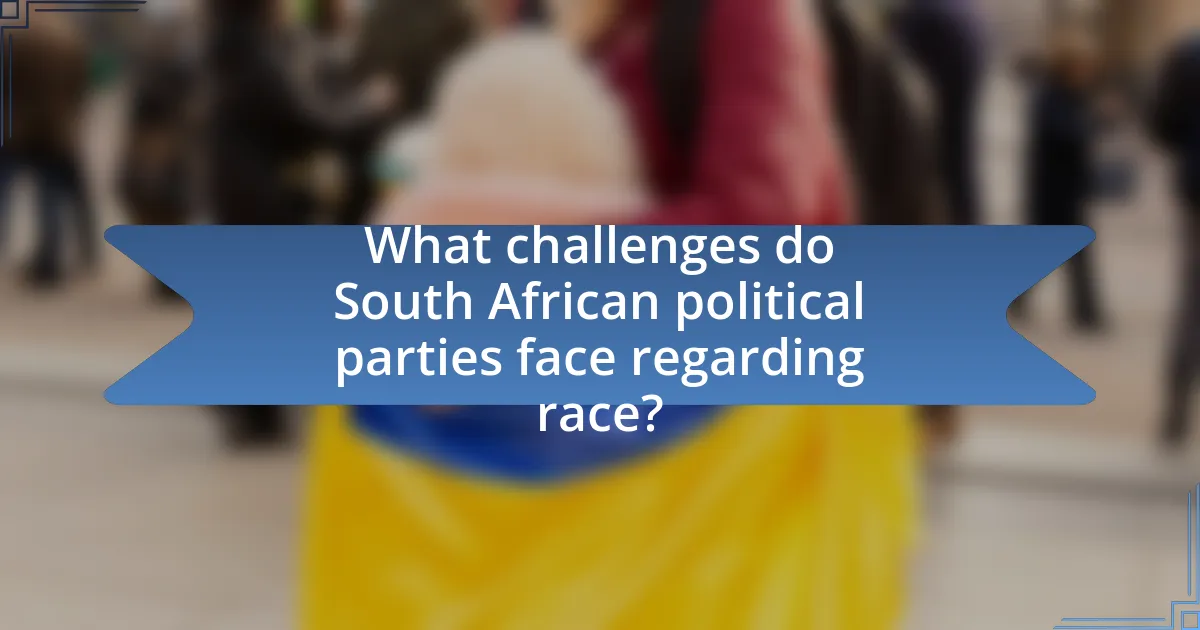
What challenges do South African political parties face regarding race?
South African political parties face significant challenges regarding race, primarily due to the legacy of apartheid and ongoing racial inequalities. These parties must navigate a complex landscape where racial identity influences voter behavior and party allegiance. For instance, the African National Congress (ANC) struggles to maintain support among black voters while addressing issues of corruption and service delivery, which can alienate constituents. Additionally, parties like the Economic Freedom Fighters (EFF) capitalize on racial tensions to gain traction, complicating the political discourse. The 2021 local elections highlighted these challenges, as voter turnout among black South Africans decreased, indicating disillusionment with traditional parties. This context underscores the difficulty political parties face in balancing racial representation with effective governance.
What are the main obstacles to achieving racial equality in politics?
The main obstacles to achieving racial equality in politics include systemic discrimination, lack of representation, and socio-economic disparities. Systemic discrimination manifests through policies and practices that disadvantage racial minorities, limiting their political participation. For instance, historical apartheid laws in South Africa created barriers that persist today, affecting access to political power. Additionally, the lack of representation in political offices means that the interests of racial minorities are often overlooked, as evidenced by the underrepresentation of Black South Africans in leadership roles despite their majority status. Socio-economic disparities further exacerbate these issues, as marginalized communities often face economic challenges that hinder their ability to engage in political processes, such as voting or running for office. These factors collectively create a challenging environment for achieving racial equality in the political landscape.
How does systemic racism impact political representation?
Systemic racism significantly undermines political representation by creating barriers that limit the participation of marginalized racial groups in the political process. In South Africa, historical policies such as apartheid systematically disenfranchised non-white populations, leading to a political landscape where representation is skewed. For instance, despite the end of apartheid, the African National Congress (ANC) has faced criticism for not adequately representing the interests of all racial groups, particularly in areas where economic disparities persist. According to the 2021 South African Census, Black South Africans make up approximately 80% of the population, yet their representation in political offices does not reflect this demographic reality, indicating a disconnect between the electorate and elected officials. This disparity is further exacerbated by socio-economic inequalities rooted in systemic racism, which hinder access to political resources and influence.
What challenges do parties face in uniting diverse racial groups?
Parties face significant challenges in uniting diverse racial groups due to historical divisions, differing socio-economic interests, and cultural disparities. Historical divisions, particularly in South Africa, stem from apartheid, which entrenched racial segregation and fostered mistrust among groups. This legacy complicates coalition-building as parties must navigate deeply rooted grievances and perceptions of inequality. Additionally, differing socio-economic interests often lead to conflicting priorities; for instance, marginalized groups may prioritize land reform and economic empowerment, while more affluent groups might focus on stability and growth. Cultural disparities further complicate unity, as varying traditions and values can create misunderstandings and hinder collaboration. These factors collectively impede the ability of political parties to forge cohesive alliances among diverse racial groups.
How can political parties effectively address racial tensions?
Political parties can effectively address racial tensions by implementing inclusive policies that promote equity and representation. For instance, parties can establish platforms that prioritize the needs and voices of marginalized communities, ensuring that their concerns are integrated into policy-making processes. Evidence from South Africa’s post-apartheid era shows that the African National Congress (ANC) has focused on affirmative action and land reform to address historical injustices, which has been crucial in reducing racial disparities. Additionally, fostering dialogue through community engagement initiatives can help build trust and understanding among diverse racial groups, as seen in various reconciliation efforts post-1994. These strategies demonstrate that proactive measures and inclusive governance can mitigate racial tensions and promote social cohesion.
What strategies can be implemented to foster inclusivity?
To foster inclusivity within South African political parties, implementing strategies such as promoting diverse leadership, ensuring equitable representation, and facilitating open dialogue is essential. Diverse leadership can be achieved by actively recruiting individuals from various racial and socio-economic backgrounds into decision-making roles, which has been shown to enhance organizational effectiveness and reflect the electorate’s demographics. Ensuring equitable representation involves creating policies that guarantee minority groups have a voice in party platforms and candidate selections, as evidenced by the success of parties that prioritize inclusivity in their electoral strategies. Facilitating open dialogue encourages discussions around race and politics, allowing for the identification of barriers to inclusivity and fostering a culture of understanding and collaboration among party members.
How can political education help mitigate racial divides?
Political education can help mitigate racial divides by fostering understanding and empathy among diverse racial groups. By educating individuals about the historical context of racial issues, such as apartheid in South Africa, political education encourages critical thinking and dialogue about systemic inequalities. Research indicates that informed citizens are more likely to engage in constructive conversations and collaborative efforts to address racial disparities. For instance, studies show that political literacy programs can lead to increased participation in democratic processes, which helps amplify marginalized voices and promote inclusive policies. This engagement ultimately contributes to bridging gaps between racial communities, fostering a more cohesive society.
What best practices can political parties adopt to navigate race relations?
Political parties can adopt inclusive dialogue and community engagement as best practices to navigate race relations effectively. By fostering open discussions that include diverse racial perspectives, parties can build trust and understanding among different communities. Research indicates that political parties that actively engage with marginalized groups tend to have higher levels of support and voter turnout, as seen in the 2019 South African elections where parties that prioritized inclusivity gained significant traction. Additionally, implementing policies that address systemic inequalities, such as equitable resource distribution and representation in leadership roles, further strengthens relationships with racially diverse constituents.
